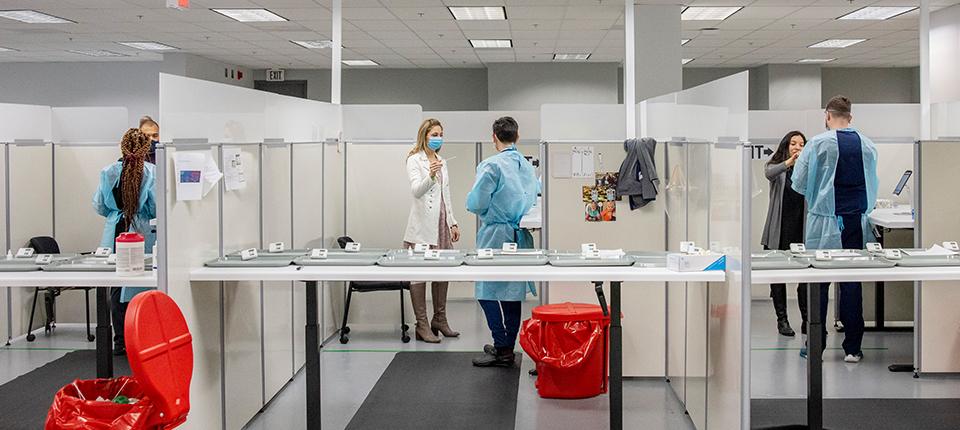Don't Exhale Yet: COVID-19 Isn't Done Testing Us
While the vaccine rollout continues, the necessity of preventative measures remains, including testing.

With the arrival of COVID-19 vaccines, you could be forgiven for breathing a sigh of relief that the worst is behind us.
Take a deep breath. The necessity for preventative measures has not left our reality.
In fact, they're as important as they've ever been.
Cases in the U.S. continue to climb, to about 24 million in January with deaths near 400,000, according to Johns Hopkins University, which has tracked COVID-19 from the beginning.
Don't exhale yet.
Wash your hands. Keep your distance. Wear a mask when you're outside your family bubble. And, yes, get tested.
"Testing is a critical first-line of defense," Andrea Wainer, Executive Vice President, Rapid and Molecular Diagnostics at Abbott, told Bloomberg reporter Michelle Fay Cortez during this year's CES, the Consumer Electronics Show. "It needs to be used in context with other hygiene practices of wearing your mask and washing your hands and by no means does this replace that. It comes together along with vaccinations. So, the more you can test, the more you can catch the virus. It's just simple math. Because at any one point in time, anyone can become infected."
A supermajority of Americans agree with Wainer.
A Harris Poll conducted at the end of 2020, showed "82% of Americans say the COVID-19 vaccine rollout will be more effective if it works in partnership with testing."
The poll of 2,064 U.S. adults also found …
- 73% of Americans believe a COVID-19 vaccine cannot succeed without other precautionary measures.
- 66% of Americans say rapid antigen COVID-19 testing is a critical tool to combat the pandemic because of its ability to detect the most infectious people.
- 86% of Americans say testing will play a significant role in combatting the pandemic while we wait for vaccines to be made widely available. The incoming Biden Administration has set a goal of delivering 100 million vaccine shots to Americans in its first 100 days, according to The New York Times.
Even if that pace can be met and maintained, it will still take about a year to vaccinate the entire U.S. population.
"What we see is that the vaccination rollout, this needs to be done in conjunction with that. The vaccination rollout, it's going to take time to get everyone vaccinated, there's going to be individuals that are not comfortable with being vaccinated, and the demand continues to rise as people are trying to get back to work and school," Wainer told CES. "So it needs to be done together and right now it's about detecting the virus, and as soon as we can have high levels of vaccination, some of the testing is going to turn to also antibody testing, determining how effective these vaccines are, how responsive individuals are to these vaccines."
That will keep the spotlight on providing as much testing to as many people in as many places as possible before we're all able to breathe easy again.
"What we see at the beginning of the year is that as the pandemic is continuing to surge and people are feeling more of an urgency to get back to normalcy, to get back to work and get back to school, we're continuing to increase our capacity and continuing to look at what we can build," Wainer said. "So, for our at-home testing just in the first quarter alone, we're going to be bringing 30 million tests to the market and ramp up 90 million of those at-home tests in the second quarter."
"And yes, we see that the demand is going to surpass the supply and so we're going to continue to look at how we can expand in manufacturing capacity to continue to meet what the world is needing from us."
Since the onset of the pandemic, Abbott has launched eight COVID-19 tests for emergency use in the U.S., and delivered more than 300 million COVID-19 tests worldwide.
Hundreds of millions of tests shipped. Hundreds of millions more to come. It's enough to take your breath away. But now's not the time to relax.
"Our goal is to make sure that we have the capacity to be able to address what's needed," Wainer said.

